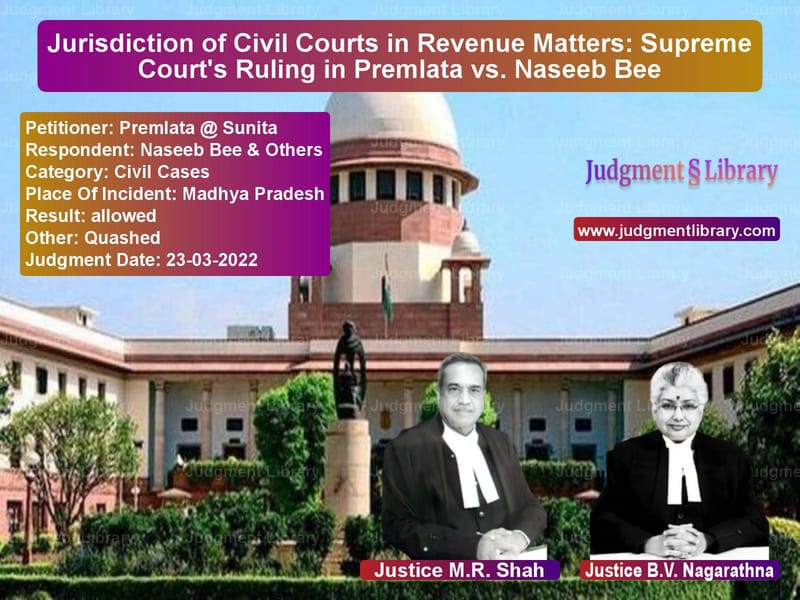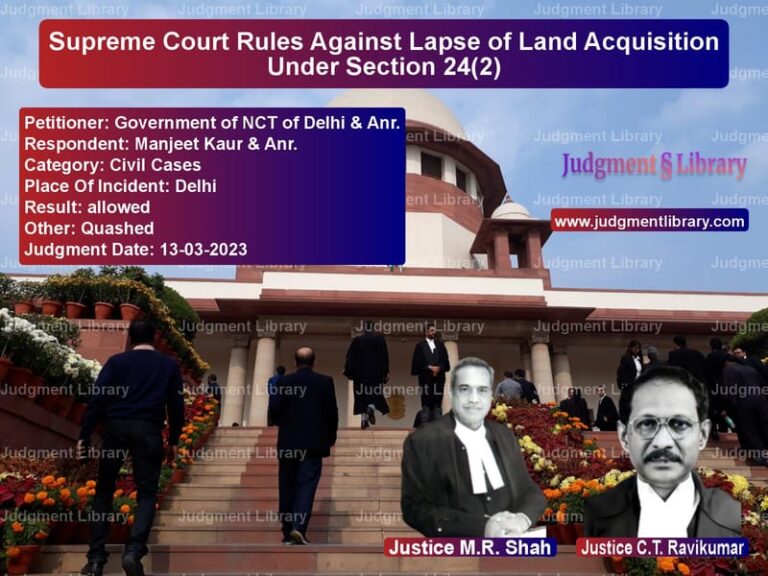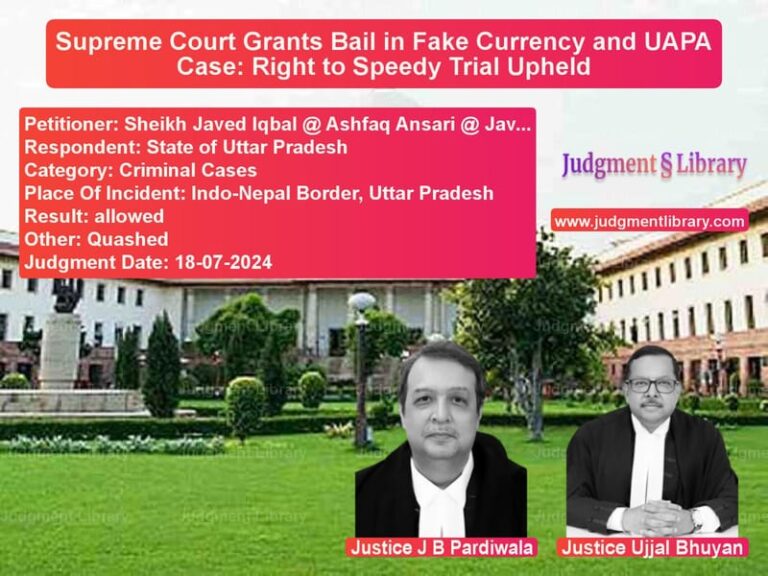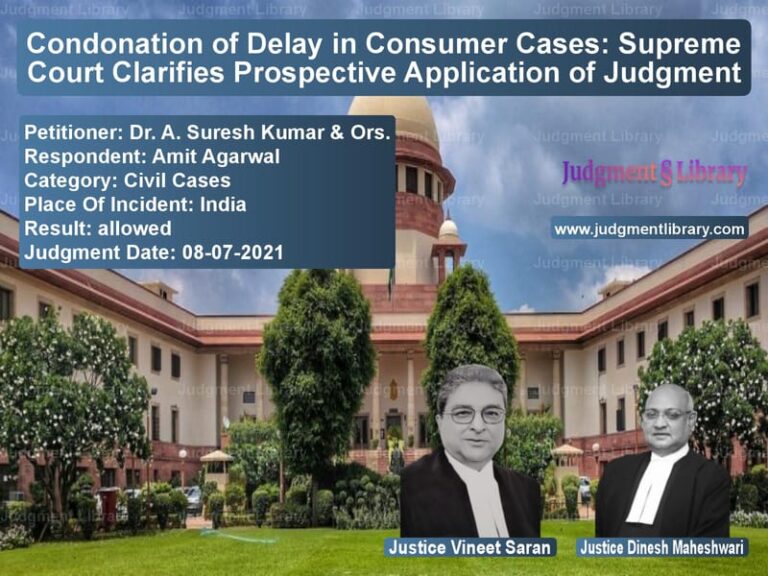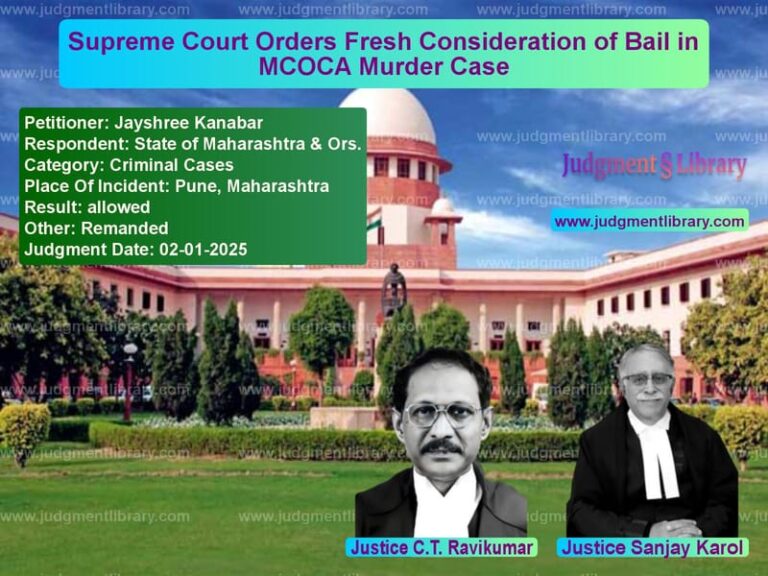Jurisdiction of Civil Courts in Revenue Matters: Supreme Court’s Ruling in Premlata vs. Naseeb Bee
The case of Premlata @ Sunita vs. Naseeb Bee & Others revolves around a critical legal question concerning the jurisdiction of Civil Courts in matters that fall under the domain of the Revenue Authorities. The Supreme Court was tasked with determining whether the Civil Court had jurisdiction to entertain a suit for possession and injunction when a similar matter had already been decided by the Revenue Authorities.
Background of the Case
The appellant, Premlata @ Sunita, initially filed proceedings before the Tehsildar under Section 250 of the Madhya Pradesh Land Revenue Code, 1959 (MPLRC) seeking possession of the disputed land. However, the respondents raised an objection, arguing that the Revenue Authority had no jurisdiction to decide the matter as it involved questions of title. The Tehsildar accepted the objection and dismissed the application, stating that the issue was beyond the jurisdiction of the Revenue Authority.
Following this decision, the appellant filed an appeal before the Sub-Divisional Officer (SDO) under Section 44 of the MPLRC. However, during the pendency of this appeal, she also initiated a suit before the Civil Court for recovery of possession and injunction.
In response, the respondents filed an application under Order 7 Rule 11 of the Code of Civil Procedure, 1908 (CPC), arguing that the suit was barred under Section 257 of the MPLRC, which prohibits Civil Courts from entertaining matters falling within the jurisdiction of Revenue Authorities. The Civil Court rejected this application, affirming its jurisdiction over the case.
Aggrieved by this decision, the respondents approached the Madhya Pradesh High Court, which allowed the revision petition and quashed the Civil Court’s order. The High Court held that the Civil Court lacked jurisdiction under Section 257 of the MPLRC, and accordingly, it rejected the plaint.
Unhappy with this ruling, the appellant filed an appeal before the Supreme Court.
Petitioner’s Arguments (Premlata @ Sunita)
The appellant contended:
- Since the Revenue Authority had explicitly refused to entertain the matter on the ground that it involved a dispute of title, the Civil Court was the only appropriate forum for deciding the issue.
- The High Court failed to consider that by rejecting the suit, it effectively left the appellant remediless, as both the Revenue Authorities and the Civil Court declined to hear her case.
- The respondents had taken contradictory stands before different forums—first arguing before the Revenue Authority that it had no jurisdiction and later claiming before the Civil Court that the suit was barred under Section 257 of the MPLRC.
- The trial court had correctly rejected the application under Order 7 Rule 11 CPC, and the High Court erred in reversing this decision.
Respondent’s Arguments (Naseeb Bee & Others)
The respondents countered:
- The dispute pertained to agricultural land, and under Section 257 of the MPLRC, the Revenue Authority had exclusive jurisdiction over such matters.
- The filing of a suit in the Civil Court was an attempt to bypass the statutory bar imposed by the MPLRC.
- The appellant had already availed the remedy before the Revenue Authority, and her appeal before the SDO was still pending when she filed the civil suit.
- The High Court had correctly applied the law by rejecting the suit on the grounds of lack of jurisdiction.
Supreme Court’s Observations
The Supreme Court examined the issue in detail and made the following key observations:
- The Revenue Authority had itself ruled that it lacked jurisdiction over the matter, which meant that the appellant had no alternative remedy before the Revenue Authorities.
- When a litigant is left without any remedy due to conflicting decisions by different forums, access to justice must be ensured by allowing the Civil Court to hear the case.
- The respondents’ conduct was contradictory as they initially argued before the Tehsildar that he had no jurisdiction and later contended before the Civil Court that it too was barred from hearing the case.
- The principle of approbate and reprobate (a party cannot take contradictory stands) was applicable in this case.
The Court ruled:
“The respondents cannot be permitted to approbate and reprobate. Once the objection raised by the respondents regarding the jurisdiction of the Revenue Authority was accepted, they cannot now argue that the Civil Court also lacks jurisdiction. Such a stand would render the appellant remediless.”
Read also: https://judgmentlibrary.com/supreme-court-upholds-specific-performance-in-land-sale-dispute/
Final Judgment
The Supreme Court ruled in favor of the appellant, holding that:
- The judgment of the High Court was quashed, and the decision of the trial court rejecting the application under Order 7 Rule 11 CPC was restored.
- The suit was restored on the file of the Civil Court and was directed to proceed on its own merits.
- The Civil Court was instructed to hear the matter in accordance with law and ensure a fair resolution.
Key Takeaways from the Judgment
- Civil Courts can entertain suits when Revenue Authorities refuse jurisdiction: If the Revenue Authority declines jurisdiction, the Civil Court can hear the matter to prevent litigants from being left without a remedy.
- Parties cannot take contradictory stands: A party that successfully argues lack of jurisdiction before one forum cannot later claim jurisdiction before another forum.
- Statutory bars on jurisdiction must be carefully interpreted: The Court emphasized that while Section 257 of the MPLRC restricts Civil Court jurisdiction, it cannot be applied in a manner that deprives litigants of a remedy.
- Trial courts’ decisions should not be overturned lightly: The Supreme Court restored the trial court’s decision, showing deference to lower courts’ discretion unless a manifest error is found.
Conclusion
This Supreme Court ruling reaffirms the fundamental principle that litigants should not be left remediless due to conflicting jurisdictional bars. The judgment serves as a crucial precedent in cases where the applicability of statutory bars on Civil Court jurisdiction is in question. By ensuring that the appellant’s suit proceeds in the Civil Court, the ruling upholds access to justice and prevents procedural technicalities from obstructing the resolution of disputes.
Petitioner Name: Premlata @ Sunita.Respondent Name: Naseeb Bee & Others.Judgment By: Justice M.R. Shah, Justice B.V. Nagarathna.Place Of Incident: Madhya Pradesh.Judgment Date: 23-03-2022.
Don’t miss out on the full details! Download the complete judgment in PDF format below and gain valuable insights instantly!
Download Judgment: premlata-@-sunita-vs-naseeb-bee-&-others-supreme-court-of-india-judgment-dated-23-03-2022.pdf
Directly Download Judgment: Directly download this Judgment
See all petitions in Property Disputes
See all petitions in Contract Disputes
See all petitions in Specific Performance
See all petitions in Landlord-Tenant Disputes
See all petitions in Succession and Wills
See all petitions in Judgment by Mukeshkumar Rasikbhai Shah
See all petitions in Judgment by B.V. Nagarathna
See all petitions in allowed
See all petitions in Quashed
See all petitions in supreme court of India judgments March 2022
See all petitions in 2022 judgments
See all posts in Civil Cases Category
See all allowed petitions in Civil Cases Category
See all Dismissed petitions in Civil Cases Category
See all partially allowed petitions in Civil Cases Category

